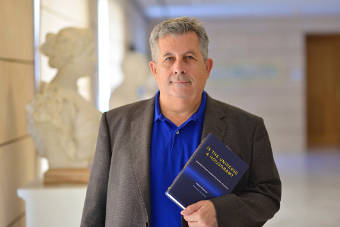
Adolfo Plasencia, writer of science and technology and columnist, presents at the Cultural Centre La Nau of the Universitat de València a book published by MIT Press, of the prestigious Massachusetts Institute of Technology (MIT). This book gives voice to 33 first-level scientists, humanists, technologists and creators. The presentation of the book takes place on Wednesday, 27th September, at the Aula Magna, at 19:30. It will be run by the science philosopher and mathematician Javier Echevarría. Admission is free.
Under the title ‘Is the universe a hologram? Scientists Answer the Most Provocative Questions’ In the book, whose preface has been written by the prestigious Tim O'Reilly (Web 2.0 formulator), the author talks with scientists, humanists and creators, among them the chemist Avelino Corma (ITQ / CSIC-UPV); the physicists Ignacio Cirac (Max Planck Inst.), Jose Bernabéu (IFIC-CERN) or Pablo Jarillo-Herrero (MIT); the neuroscientist Álvaro Pascual-Leone (Harvard); the painter José María Yturralde; the head of the Galileo Program, Javier Benedicto (ESA); or the philosophers Javier Echevarría (Ikerbasque) and David Casacuberta (UB); the researcher in Artificial Intelligence José Hernández Orallo (UPV-Univ.Cambridge); the computer scientist Bernardo Cuenca (U.Oxford); and the brain-machine interface researcher Joseph M. Carmena (UC Berkeley).
Among the international personalities are highlighted the promoters of the free software and open source movements Tim O’Reilly, John Perry Barlow, Hal Abelson (MIT CSAIL) and Richard Stallman (FSF); the Nobel Prize of Chemistry Mario J. Molina (USC San Diego); the restorer of Michelangelo’s frescos of the Sixtin Chapel, Gianluigi Colalucci; the professors and researchers Henry Jenkins (USC Los Ángeles) y Hal Abelson (MIT); the researcher in affective calculation of the MIT MediaLab, Rosalind W. Picard, the astrophysicist Sara Seager (MIT); o the vice president and CIO of Harvard, Anne Margulies.
All José Bernabéu, Pablo Jarillo-Herrero, José Hernández-Orallo, José M. Carmena, Avelino Corma and José María Yturralde have been trained or have practiced at the Universitat de València.
‘It is not a book about interviews but dialogues, since both genres are conceptually different. From the Dialogues of Plato we know that one of the best ways for the joint search of knowledge is to do it dialogically’, explains the author.
The dialogues were conducted in person, so the author travelled to meet the participants of this book and obtain information about physics, cosmology, neurosciences, artificial intelligence, computing, technology and new digital media, philosophy, education, artificial intelligence, art or the future of work, among other matters. The book consist of four blocs: ‘The physical world’, ‘Information’, ‘Intelligence’ and an epilogue-dialogue where the artist José María Yturralde reflects on the relationships between science and art. He wonders if if in art someone can paint the void; go to the past and change it; or whether the beauty equation ≠ truth is true or not.
There are 14 Spaniards and 8 Valencians among the protagonists, who work in prestigious cutting-edge research centres from around the world. Plasencia values very favourably the fact that among this series of top-level scientists are also these prestigious Spanish researchers and creators.
Adolfo Plasencia, blogger, writer and columnist of science and technology, directed and presented for more than six years the science and technology television program 'Tecnópolis'. He co-founded the MITUPV Exchange, a joint initiative of MIT and the Universitat Politècnica de València, which ran for 12 years.
Escola Europea de Pensament Lluís Vives
The event is part of the activities of the Escola Europea de Pensament Lluís Vives, a cultural project, promoted by the Office of the Vice-Principal for Culture and Equality. It counts on the management of the General Foundation of the Universitat de València, which is configured as a space for reflection and open debate, participatory and critical on current affairs worldwide and also for Valencian society.
Besides, the Escola counts on the participation of other actors of public administration and civil society: The President of the Valencian government, the City Hall of Valencia, the Valencian Department of Transparency and Education, Research, Culture and Sports, the Acadèmia Valenciana de la Llengua, the Alfons el Magnànim Institute, the Escola Europea d’Humanitats and the Caixa Popular.
Last update: 26 de september de 2017 10:53.
News release


















